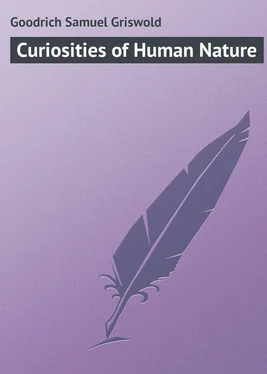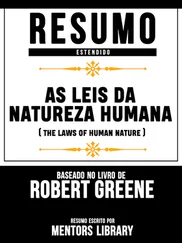Samuel Goodrich - Curiosities of Human Nature
Здесь есть возможность читать онлайн «Samuel Goodrich - Curiosities of Human Nature» — ознакомительный отрывок электронной книги совершенно бесплатно, а после прочтения отрывка купить полную версию. В некоторых случаях можно слушать аудио, скачать через торрент в формате fb2 и присутствует краткое содержание. Жанр: foreign_prose, на английском языке. Описание произведения, (предисловие) а так же отзывы посетителей доступны на портале библиотеки ЛибКат.
- Название:Curiosities of Human Nature
- Автор:
- Жанр:
- Год:неизвестен
- ISBN:нет данных
- Рейтинг книги:3 / 5. Голосов: 1
-
Избранное:Добавить в избранное
- Отзывы:
-
Ваша оценка:
- 60
- 1
- 2
- 3
- 4
- 5
Curiosities of Human Nature: краткое содержание, описание и аннотация
Предлагаем к чтению аннотацию, описание, краткое содержание или предисловие (зависит от того, что написал сам автор книги «Curiosities of Human Nature»). Если вы не нашли необходимую информацию о книге — напишите в комментариях, мы постараемся отыскать её.
Curiosities of Human Nature — читать онлайн ознакомительный отрывок
Ниже представлен текст книги, разбитый по страницам. Система сохранения места последней прочитанной страницы, позволяет с удобством читать онлайн бесплатно книгу «Curiosities of Human Nature», без необходимости каждый раз заново искать на чём Вы остановились. Поставьте закладку, и сможете в любой момент перейти на страницу, на которой закончили чтение.
Интервал:
Закладка:
On another occasion a person proposed to him this question: in a body, the three sides of which are 23,145,789 yards, 5,642,732 yards, and 54,965 yards, how many cubic eighths of an inch? In about five hours Jedediah had accurately solved this intricate problem, though in the midst of business, and surrounded by more than a hundred laborers.
Next to figures, the only objects of Jedediah's curiosity were the king and royal family. So strong was his desire to see them, that in the beginning of the spring of 1754, he walked up to London for that purpose, but returned disappointed, as his majesty had removed to Kensington just as he arrived in town. He was, however, introduced to the Royal Society, whom he called the Folk of the Siety Court . The gentlemen present asked him several questions in arithmetic to try his abilities, and dismissed him with a handsome present.
During his residence in the metropolis, he was taken to see the tragedy of King Richard the Third, performed at Drury Lane, Garrick being one of the actors. It was expected that the novelty of everything in that place, together with the splendor of the surrounding objects, would have filled him with astonishment; or that his passions would have been roused in some degree, by the action of the performers, even though he might not fully comprehend the dialogue. This, certainly, was a rational idea; but his thoughts were far otherwise employed. During the dances, his attention was engaged in reckoning the number of steps; after a fine piece of music, he declared that the innumerable sounds produced by the instruments perplexed him beyond measure, but he counted the words uttered by Mr. Garrick, in the whole course of the entertainment; and declared that in this part of the business, he had perfectly succeeded.
Heir to no fortune, and educated to no particular profession, Jedediah Buxton supported himself by the labor of his hands. His talents, had they been properly cultivated, might have qualified him for acting a distinguished part on the theatre of life; he, nevertheless, pursued the "noiseless tenor of his way," content if he could satisfy the wants of nature, and procure a daily subsistence for himself and family. He was married and had several children. He died in the year 1775, aged seventy years. Though a man of wonderful powers of arithmetical calculation, and generally regarded as a prodigy in his way – it is still obvious that, after the practice of years, he was incapable of solving questions, which Zerah Colburn, at the age of six or seven years, answered in the space of a few seconds.
WILLIAM GIBSON
William Gibson was born in the year 1720, at the village of Bolton, in Westmoreland, England. On the death of his father, he put himself to a farmer to learn his business. When he was about eighteen or nineteen, he rented a small farm of his own, at a place called Hollins, where he applied himself assiduously to study.
A short time previous to this, he had admired the operation of figures, but labored under every disadvantage, for want of education. As he had not yet been taught to read, he got a few lessons in English, and was soon enabled to comprehend a plain author. He then purchased a treatise on arithmetic; and though he could not write, he soon became so expert a calculator, from mental operations only, that he could tell, without setting down a figure, the product of any two numbers multiplied together, although the multiplier and the multiplicand each of them consisted of nine figures. It was equally astonishing that he could answer, in the same manner, questions in division, in decimal fractions, or in the extraction of the square or cube roots, where such a multiplicity of figures is often required in the operation. Yet at this time he did not know that any merit was due to himself, conceiving that the capacity of other people was like his own.
Finding himself still laboring under farther difficulties for want of a knowledge of writing, he taught himself to write a tolerable hand. As he had not heard of mathematics, he had no idea of anything, in regard to numbers, beyond what he had learned. He thought himself a master of figures, and challenged all his companions and the members of a society he attended, to a trial. Something, however, was proposed to him concerning Euclid. As he did not understand the meaning of the word, he was silent; but afterwards found it meant a book, containing the elements of geometry; this he purchased, and applied himself very diligently to the study of it, and against the next meeting he was prepared with an answer in this new science.
He now found himself launching out into a field, of which before he had no conception. He continued his geometrical studies; and as the demonstration of the different propositions in Euclid depend entirely upon a recollection of some of those preceding, his memory was of the utmost service to him. Besides, it was a study exactly adapted to his mind; and while he was attending to the business of his farm, and humming over some tune or other, his attention was often engaged with some of his geometrical propositions. A few figures with a piece of chalk, upon the knee of his breeches, or any other convenient spot, were all he needed to clear up the most difficult parts of the science.
He now began to be struck with the works of nature, and paid particular attention to the theory of the earth, the moon, and the rest of the planets belonging to this system, of which the sun is the centre; and considering the distance and magnitude of the different bodies belonging to it, and the distance of the fixed stars, he soon conceived each of them to be the centre of a different system. He well considered the law of gravity, and that of the centripetal and centrifugal forces, and the cause of the ebbing and flowing of the tides; also the projection of the sphere – stereographic, orthographic, and gnomical; also trigonometry and astronomy. By this time he was possessed of a small library.
He next turned his thoughts to algebra, and took up Emerson's treatise on that subject, and went through it with great success. He also grounded himself in the art of navigation and the principles of mechanics; likewise the doctrine of motion, of falling bodies, and the elements of optics, &c., as a preliminary to fluxions, which had but lately been discovered by Sir Isaac Newton; as the boundary of the mathematics, he went through conic sections, &c. Though he experienced some difficulty at his first entrance, yet he did not rest till he made himself master of both a fluxion and a flowing quantity. As he had paid a similar attention to the intermediate parts, he soon became so conversant with every branch of the mathematics, that no question was ever proposed to him which he could not answer.
He used to take pleasure in solving the arithmetical questions then common in the magazines, but his answers were seldom inserted, except by or in the name of some other person, for he had no ambition to make his abilities known. He frequently had questions from his pupils and other gentlemen in London; from the universities of Oxford and Cambridge, and different parts of the country, as well as from the university of Gottingen in Germany. These, however difficult, he never failed to answer; and from the minute inquiry he made into natural philosophy, there was scarcely a phenomenon in nature, that ever came to his knowledge or observation, but he could, in some measure at least, reasonably account for it.
He went by the name of Willy-o'-th'-Hollins, for many years after he left his residence in that place. The latter portion of his life was spent in the neighborhood of Cartmell, where he was best known by the name of Willy Gibson, still continuing his former occupation. For the last forty years he kept a school of about eight or ten gentlemen, who boarded and lodged at his own farm-house; and having a happy turn in explaining his ideas, he formed a great number of very able mathematicians, as well as expert accountants. This self-taught philosopher and wonderful man, died on the 4th of October, 1792, at Blaith, near Cartmell, in consequence of a fall, leaving behind him a widow and ten children.
Читать дальшеИнтервал:
Закладка:
Похожие книги на «Curiosities of Human Nature»
Представляем Вашему вниманию похожие книги на «Curiosities of Human Nature» списком для выбора. Мы отобрали схожую по названию и смыслу литературу в надежде предоставить читателям больше вариантов отыскать новые, интересные, ещё непрочитанные произведения.
Обсуждение, отзывы о книге «Curiosities of Human Nature» и просто собственные мнения читателей. Оставьте ваши комментарии, напишите, что Вы думаете о произведении, его смысле или главных героях. Укажите что конкретно понравилось, а что нет, и почему Вы так считаете.












